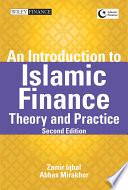
Islamic Finance
The Regulatory Challenge
"Islamic Finance: The Regulatory Challenge…is therefore timely and a truly welcome addition to the growing literature on this subject…I congratulate the two professors for their fine contribution to the evolving art and science of the regulation of Islamic finance." —Dr. Zeti Akhtar Aziz, Governor, Bank Negara Malaysia "The World's financial regulators have taken too long to appreciate the importance of adapting their regulatory frameworks to the needs of the fast growing Islamic finance sector. Simon Archer and Rifaat Ahmed, the leaders in the field, have put together a fascinating collection of essays which show just what has to be done. It is a very timely book indeed." —Howard Davies, Director, London School of Economics "The emergence of Islamic finance as a major force in the world financial system has focused attention on regulatory issues. This book, edited by Professor Archer and Professor Rifaat, two of the most respected figures in the field, is an important point of reference for those who have to deal with these issues, whether in regulatory authorities, or in the financial institutions themselves." —Professor William Blair QC, Grays Inn, London "There is now great interest, both in financial and legal circles, in reliable and authoritative texts on Islamic finance. I have no doubt that the availability of Islamic Finance: The Regulatory Challenge will be warmly welcomed by those who provide financial and legal services. The work will be of great assistance to them." —The Rt Hon the Lord Woolf of Barnes, Law Lord and former Lord Chief Justice of England & Wales
- ISBN 13 : 0470821892
- ISBN 10 : 9780470821893
- Judul : Islamic Finance
- Sub Judul : The Regulatory Challenge
- Pengarang : Simon Archer, Rifaat Ahmed Abdel Karim, Rifaat Ahmed Abdel Karim, Rifaat Ahmed Abdel Karim,
- Kategori : Business & Economics
- Penerbit : John Wiley & Sons
- Bahasa : en
- Tahun : 2007
- Halaman : 441
- Google Book : http://books.google.co.id/books?id=VziV1eGh14kC&dq=intitle:Islamic+Financial+Management&hl=&source=gbs_api
-
Ketersediaan :
This book address issues such as: Why are the frameworks devised for the conventional financial sector unsuitable for Islamic financial services? What is the nature of risks in Islamic banking?









